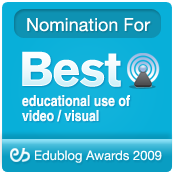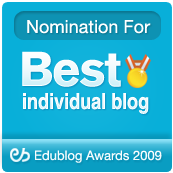Crossposted on the Adobe Education Leaders blog (http://blogs.adobe.com/educationleaders/)
 I remember the first time I saw Photoshop.
I remember the first time I saw Photoshop.
I think it must have been about 1993 or so, when I got a free copy that came with a scanner purchased by my school. It must have been a “lite” version of Photoshop because I seem to recall that it didn’t support layers. Even so, I really enjoyed playing with it, and I ended up installing it on all the computers in the school computer lab (license? what license?) and I started teaching the kids how to create stuff with it. They just blew me away with what they could do with it, even without layers!
It was around the same time that I stumbled across an unused copy of Aldus Pagemaker in an out-of-the-way cupboard, and I convinced the school principal that we should use it to do the school yearbook; his agreement to my suggestion saw me suddenly escalated to head of the yearbook committee, a job that rolled on for many years and many issues beyond that. Of course, once you start working in Pagemaker (and now InDesign) there is a fairly fundamental expectation that Photoshop is a key part of that workflow.
From these accidental beginnings, I developed a long standing relationship with Photoshop. In the late 90s I was working with students to build collaborative websites, and of course all the graphics were done with Photoshop. We discovered all sorts of interesting features like batch processing, we learned to do decent colour corrections, to crop and manipulate images so that they fitted our needs. We discovered, often the hard way, about important concepts like pixel depth, image resolution, colour gamut, and of course the one that catches every self-taught Photoshop user out at some stage, RGB vs CMYK. We made images for the web and for print, we built graphics from scratch and we did weird things to existing photos. I’m just a teacher, not a graphic designer, but I’ve lost track of the hours and hours and hours I’ve spent inside Photoshop over the last 15+ years.
And here’s the thing about Photoshop. Heck, here’s the thing about pretty much all of Adobe’s products… the more I know, the more I realise I don’t know. Every time I learn some new technique or skill, the self-satisfied smug feeling of cleverness lasts about five seconds before I realise that there is just so much more I could know about it, that I could do with it. Whenever I taught kids a unit of work on Photoshop I used to conclude it with an in-class practical test, where I’d give them some images and a problem to solve – it might be to produce some CD cover artwork or a magazine cover, usually with a few constraints or requirements to make them have to think about it a little – and they’d just astound me at what they’d come up with. “Creative Suite” is a good name for these products, because they really do force you into creativity mode. Most of the time after one of these class tests, I’d spend the next few lessons getting the kids to deconstruct what they’d done, to teach me how they got certain effects. In my Photoshop classes I may have been the teacher, but we were all learners.
When I was offered a place in the Adobe Education Leaders program, I was thrilled to be part of it, and felt relatively well qualified to be part of it given that I’d spent over 15 years teaching Photoshop, Indesign, Dreamweaver and Flash to students. Of course, mixing with other AELs and seeing the fantastic things they do is a great way to reinforce just how little I do actually know, but it’s still been an incredibly valuable association for me.
I got thinking about this lately because I’ve been checking out the tutorials on the newly redesigned Adobe TV. It’s an awesome resource, with every application now having a Learn series, a set of basic tutorials that teach the essential skills required to get up to speed quickly… I wish this had been around when i started playing with Photoshop! As well as the Learn tutorials, there are a bunch of more advanced tutorials that delve into some of the trickier and more esoteric concepts.
And Adobe TV is not the only resource I turn to when I want to know more. There seems to be plenty of other places to learn the how-to stuff for Adobe’s products. Some of my favourites are the Layers TV podcast with Corey Barker and RC, the Creative Suite Podcast with Terry White, Creative Sweet TV with Mike McHugh, Instant Indesign with Gabriel Powell, The Russell Brown Show… the list goes on. I subscribe to all of these through iTunes and they just drop onto my iPhone for later watching. It’s a great way to learn. I’m sure there are many other fantastic resources for learning this stuff… perhaps you could leave a note in the comments about some of the resources you have found useful for learning.
Finally, I just wanted to mention a book I bought recently about Photoshop that is quite simply one of the most amazing Photoshop guides I’ve ever seen. It’s simply called Creative Photoshop CS4 by Derek Lea, and I’m just stunned at how incredible this guy is when it comes to Photoshop. I’ve been working my way through some of his exercises and have been discovering something new on almost every page. When you can use a product for over 15 years, and still constantly discover new things, it says a lot about the depth of the product and the open-ended nature of what it lets you do with it.
I realise more than ever that there is so much I don’t know about Photoshop (and most of the other Adobe products!) But I love that feeling of learning, of discovering, of digging deeper and just discovering that there really is no “bottom” to hit.



 Over the last year or so, I’ve been invited to present at a number of conferences, including a couple of keynotes. It’s been an enriching experience, and one I enjoy immensely, although I do always end up feeling like I’m “a mile wide and and inch deep”, to coin a well-worn phrase. I feel like I know quite a bit about a lot, but not a lot about anything. Despite the fact that I like to dabble in lots of stuff, I’m not sure I’m really a master of any of it.
Over the last year or so, I’ve been invited to present at a number of conferences, including a couple of keynotes. It’s been an enriching experience, and one I enjoy immensely, although I do always end up feeling like I’m “a mile wide and and inch deep”, to coin a well-worn phrase. I feel like I know quite a bit about a lot, but not a lot about anything. Despite the fact that I like to dabble in lots of stuff, I’m not sure I’m really a master of any of it.